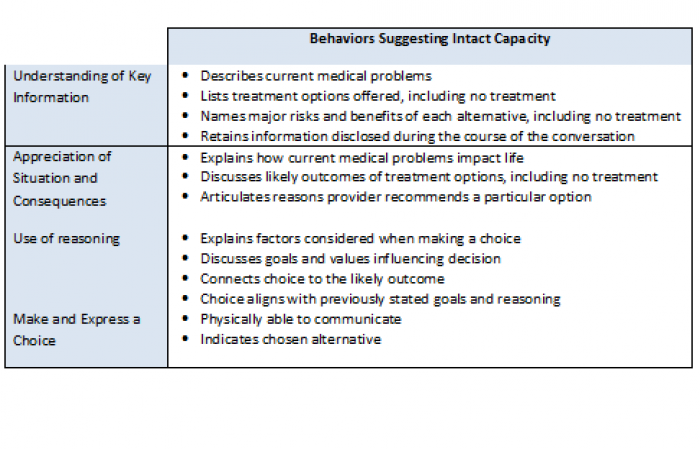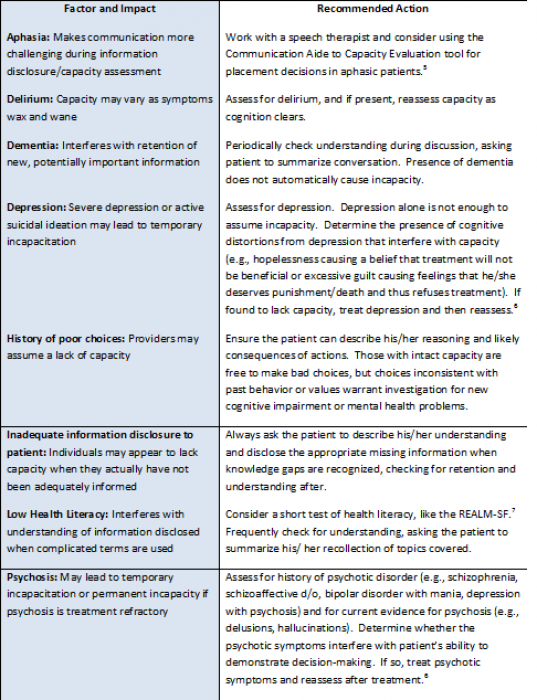Medical Decision-making Capacity Assessment - #60
Take QuizDetermine an older adult’s ability to make medical decisions in a hospital or clinic setting.
Medical decision-making capacity is the ability “to understand information relevant to a treatment
decision and to appreciate the reasonably foreseeable consequences of a decision or lack of decision.”2 Capacity and competency both refer to one’s ability to make decisions, but there are key distinctions. 60-1
In general, four elements must be present for a person to have medical decision-making capacity (see column on left, below).3,4 When assessing capacity, address each area during the interview. 60-2
Many tools exist to assist in assessment of decision-making capacity. The following are commonly used, reliable, and feasible to perform in an office setting: Aid to Capacity Evaluation (ACE), Hopkins Competency Assessment Tool (HCAT), and Understanding Treatment Disclosure (UTD)1.
When assessing capacity, providers must consider multiple factors that may influence responses. 60-3
Apply the four key abilities required for decision-making capacity to the patient interview and determine whether an elderly adult has capacity to make a given medical decision.
Science Principles
- Describe the differences between decision-making capacity and competency.
- Name the four abilities an individual must demonstrate to have decision-making capacity.
- Describe observable patient behaviors that demonstrate these abilities.
- Identify available tools to facilitate capacity assessment.
- Evaluate a patient for factors that may confound capacity assessment.
- Appreciate the fluid nature of capacity assessment and the need to re-evaluate over time
Geriatric Topics
ACGME Compentencies
Science Principles
1. Sessums LL, Zembrzuska H, Jackson JL. Does this patient have medical decision-making capacity? Journal of the American Medical Association 2011; 306(4): 420-427.
2. Etchells E, Sharpe G, Elliot C, Singer PA. Bioethics for clinicians: Capacity. Canadian Medical Association Journal 1996; 155 (6): 657-661.
3. Appelbaum PS, Grisso T. Assessing patients’ capacities to consent to treatment. New England Journal of Medicine 1988 Dec 22; 319(25): 1635-1638.
4. Tunzi M. Can the patient decide? Evaluating patient capacity in practice. American Family Physician 2001; 64: 299-306.
5. Carling-Rowland, Alexandra. (2012). Communication aid to capacity evaluation (CACE). Available at: http://www.aphasia.ca/home-page/health-care-professionals/resources-and-tools/cace/ Accessed 5/11/2016.
6. Okai D, Owen G, McGuire H, Singh S, Churchill R, Hotopf M. Mental capacity in psychiatric patients: systematic review. British Journal of Psychiatry 2007; 191: 291-297.
7. Arozullah AM, Yarnold PR, Bennett CL, Soltysik RC, Wolf MS, Ferreira RM, Lee SD, Costello C, Shakir A, Denwood C, Bryant FB, Davis T. Development and Validation of a Short-Form, Rapid Estimate of Adult Literacy in Medicine. Medical Care 2007; 45: 1026-1033.
Users are free to download and distribute Geriatric Fast Facts for informational, educational and research purposes only. See Term of Use for additional information.
Disclaimer: Geriatric Fast Facts are for informational, educational and research purposes only. Geriatric Fast Facts are not, nor are they intended to be, medical advice. Health care providers should exercise their own independent clinical judgment when diagnosing and treating patients. Some Geriatric Fast Facts cite the use of a product in a dosage, for an indication, or in a manner other than that recommended in the product labeling. Accordingly, the official prescribing information should be consulted before any such product is used.


